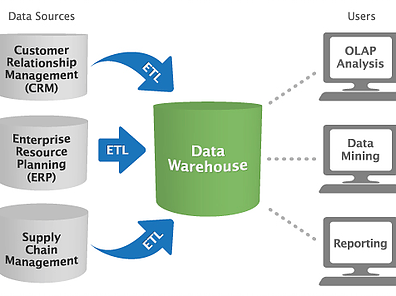Business Intelligence and Analytics
Business intelligence (BI) software has gained considerable traction since its introduction as "decision support systems" in the 1960s. Today, there are over 100 BI software companies selling some type of business intelligence tool. BI software helps organizations organize and analyze data to make better decisions. This could include internal data from company departments as well as data from external sources, such as marketing data services, social media channels or even macroeconomic information.The BI market is growing rapidly because of the proliferation of data to analyze. Over the past few decades, companies that have deployed Enterprise Resource Planning (ERP), Customer Relationship Management (CRM) and other applications are now sitting on a mountain of data that can be analyzed. In addition, the growth of the Web has increased the demand for tools that can analyze large data sets.One of the biggest trends in the BI market is the shift in software architecture and design to more user-friendly applications. These applications are now being used by business users--not just IT staff--to analyze particular sets of departmental data, including marketing, procurement, retail and Web data.
Matching the Right BI Tool to Your Needs
- data management tools
- data discovery applicationsreporting
- tools (including dashboards and visualization software).
What BI tools you need depends on how your data is currently managed and how you would like to analyze it. For example, if your data is currently scattered across disparate transactional databases, you might need to build a data warehouse to centralize it and invest in data management tools that offer Extract, Transform, and Load (ETL) functionality to move and re-structure the data.Once data is given a common structure and format, you can invest in data discovery applications that offer Online Analytical Processing (OLAP), data mining and the capability to create custom ad hoc reports. And because information is stored within the data warehouse, users can quickly pull reports without impacting the performance of the organization's software applications, such as CRM, ERP and supply chain management solutions. We've illustrated this concept in the image below:

Data Management Tools
Better decision-making starts with better data. Data management tools help clean-up "dirty data", organize information by providing format and structure, and prepare databases for analyses.
Data Discovery Applications
The ability to sift through data and come to meaningful conclusions is one of the most powerful benefits of adopting business intelligence tools. Data discovery applications help users make sense of their data, whether it be through quick, multivariate analysis during OLAP or via advanced algorithms and statistical computations during data mining.
Reporting Tools
In the words of John W. Tuckey, "The greatest value of a picture is when it forces us to notice what we never expected to see." Reporting applications are an important way to present data and easily convey the results of analysis.
BI users are increasingly business users--not IT staff--who need quick, easy-to-understand displays of information. In response, software vendors have been working to mask the complexity of these applications and increasingly focus on the user experience.